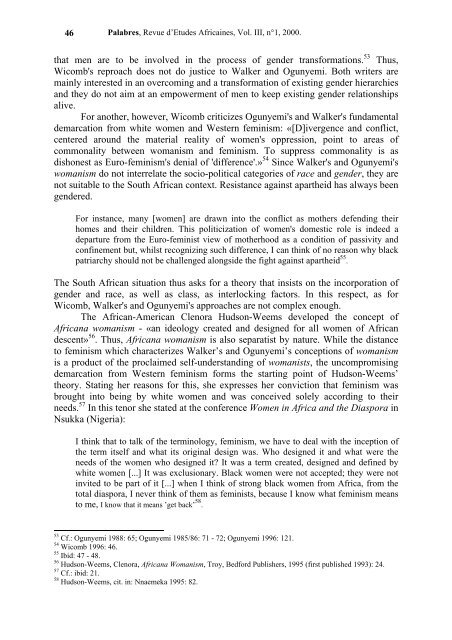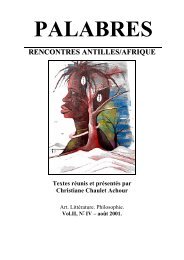Télécharger - Revue Palabres
Télécharger - Revue Palabres
Télécharger - Revue Palabres
Create successful ePaper yourself
Turn your PDF publications into a flip-book with our unique Google optimized e-Paper software.
46<br />
<strong>Palabres</strong>, <strong>Revue</strong> d’Etudes Africaines, Vol. III, n°1, 2000.<br />
that men are to be involved in the process of gender transformations. 53 Thus,<br />
Wicomb's reproach does not do justice to Walker and Ogunyemi. Both writers are<br />
mainly interested in an overcoming and a transformation of existing gender hierarchies<br />
and they do not aim at an empowerment of men to keep existing gender relationships<br />
alive.<br />
For another, however, Wicomb criticizes Ogunyemi's and Walker's fundamental<br />
demarcation from white women and Western feminism: «[D]ivergence and conflict,<br />
centered around the material reality of women's oppression, point to areas of<br />
commonality between womanism and feminism. To suppress commonality is as<br />
dishonest as Euro-feminism's denial of 'difference'.» 54 Since Walker's and Ogunyemi's<br />
womanism do not interrelate the socio-political categories of race and gender, they are<br />
not suitable to the South African context. Resistance against apartheid has always been<br />
gendered.<br />
For instance, many [women] are drawn into the conflict as mothers defending their<br />
homes and their children. This politicization of women's domestic role is indeed a<br />
departure from the Euro-feminist view of motherhood as a condition of passivity and<br />
confinement but, whilst recognizing such difference, I can think of no reason why black<br />
patriarchy should not be challenged alongside the fight against apartheid 55 .<br />
The South African situation thus asks for a theory that insists on the incorporation of<br />
gender and race, as well as class, as interlocking factors. In this respect, as for<br />
Wicomb, Walker's and Ogunyemi's approaches are not complex enough.<br />
The African-American Clenora Hudson-Weems developed the concept of<br />
Africana womanism - «an ideology created and designed for all women of African<br />
descent» 56 . Thus, Africana womanism is also separatist by nature. While the distance<br />
to feminism which characterizes Walker’s and Ogunyemi’s conceptions of womanism<br />
is a product of the proclaimed self-understanding of womanists, the uncompromising<br />
demarcation from Western feminism forms the starting point of Hudson-Weems’<br />
theory. Stating her reasons for this, she expresses her conviction that feminism was<br />
brought into being by white women and was conceived solely according to their<br />
needs. 57 In this tenor she stated at the conference Women in Africa and the Diaspora in<br />
Nsukka (Nigeria):<br />
I think that to talk of the terminology, feminism, we have to deal with the inception of<br />
the term itself and what its original design was. Who designed it and what were the<br />
needs of the women who designed it? It was a term created, designed and defined by<br />
white women [...] It was exclusionary. Black women were not accepted; they were not<br />
invited to be part of it [...] when I think of strong black women from Africa, from the<br />
total diaspora, I never think of them as feminists, because I know what feminism means<br />
to me, I know that it means ’get back’ 58 .<br />
53<br />
Cf.: Ogunyemi 1988: 65; Ogunyemi 1985/86: 71 - 72; Ogunyemi 1996: 121.<br />
54<br />
Wicomb 1996: 46.<br />
55<br />
Ibid: 47 - 48.<br />
56<br />
Hudson-Weems, Clenora, Africana Womanism, Troy, Bedford Publishers, 1995 (first published 1993): 24.<br />
57<br />
Cf.: ibid: 21.<br />
58<br />
Hudson-Weems, cit. in: Nnaemeka 1995: 82.



